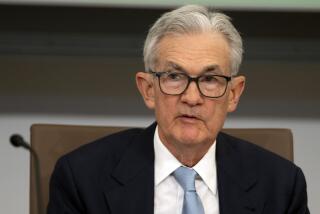Fed chairman urges Obama, Congress to try to avoid ‘fiscal cliff’
WASHINGTON — Federal Reserve Chairman Ben S. Bernanke urged President Obama and Congress to shield the fragile economy from the full brunt of the so-called fiscal cliff or risk another recession just as the recovery is taking hold.
Speaking Tuesday at the New York Economic Club, Bernanke warned that the Fed doesn’t have the tools left to offset the one-two punch of significantly higher taxes and sharply reduced government spending set to begin in January.
“Coming together to find fiscal solutions will not be easy, but the stakes are high,” Bernanke said.
The housing market recently has shown “some clear signs of improvement,” but the economic recovery still faces significant head winds. Among them is U.S. fiscal policy, which he said “may intensify in force in coming quarters.”
“Congress and the administration will need to protect the economy from the full brunt of the severe fiscal tightening at the beginning of next year that is built into current law — the so-called fiscal cliff,” he said.
“The realization of all of the automatic tax increases and spending cuts that make up the fiscal cliff, absent offsetting changes, would pose a substantial threat to the recovery,” Bernanke said.
He noted that the Congressional Budget Office and many economists project “a fiscal shock of that size would send the economy toppling back into recession.”
If the White House and Congress can’t reach a deal to avoid the fiscal cliff, the Fed won’t be able to prevent another recession because it has exhausted just about all its monetary measures to try to boost the economy, Bernanke said.
The Fed is in the midst of a third round of stimulative bond buying, known as quantitative easing. But there is not much else the central bank can do other than buy bonds, a strategy that has kept short-term interest rates near zero since late 2008 and will probably continue until at least mid-2015.
Any deficit-reduction deal probably would involve higher taxes and reduced government spending that would be a drag on economic growth next year, Bernanke said. But that’s better than the alternative.
“My advice on this is sort of ‘do no harm,’ and in that respect, what I’m most concerned about … is the full force of the fiscal cliff,” Bernanke said. “The ability of the Fed to offset head winds is not infinite.”
A deal to avoid the fiscal cliff and start reducing the soaring national debt will help ease some of the uncertainty that businesses have.
Bernanke said he could not quantify how much fiscal cliff concerns were harming growth, but said the effect of uncertainty was “probably significant.”
The European debt crisis also is a source of concern. But Bernanke said that avoiding the fiscal cliff would reduce uncertainty and potentially provide a big boost to the U.S. recovery because there would be “a greater level of security about where the country is going.”
More to Read
Inside the business of entertainment
The Wide Shot brings you news, analysis and insights on everything from streaming wars to production — and what it all means for the future.
You may occasionally receive promotional content from the Los Angeles Times.











